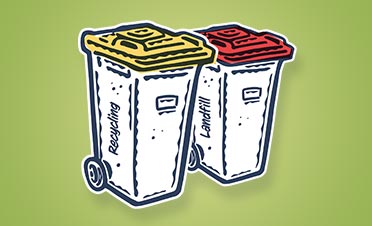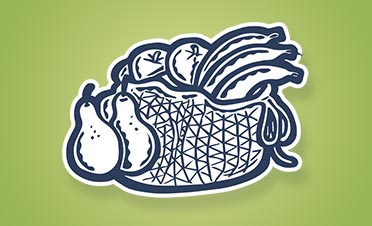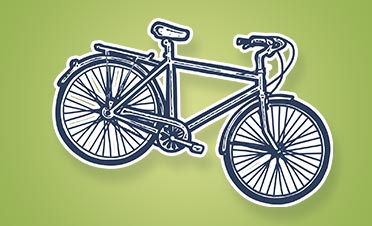Get it sussed
As students, we have a huge amount of collective power, after all, demand drives change.
By being aware of the consequences of our actions, making a conscious effort to adopt more sustainable habits, and working together for broader change, we can overcome the environmental challenges the planet is currently facing.
These tips and alternative ways of doing things will help you to live more sustainably. Not all of them will apply to you, but where they do, give them a go. You'll find they are really simple and will help you continue to live as you want to live, but cheaper, better and more sustainably.
A massive shout-out to Te Ao Turoa Partnership for making this possible
Every little bit helps – get stuck in
Good for you, the wallet and the planet
Adopting a more sustainable approach to life is easy. Here are some suggestions for you to live a green life while you're a student.
Recycling/Managing your waste
Dunedin has a weekly kerbside collection for rubbish and recycling. Blue bins and yellow-lidded bins are collected on alternate weeks. Dunedin City Council (DCC) rubbish bags are collected weekly.
Your collection day is dependent on your flat's location. Type your address into the calculator on the Dunedin City Council (DCC) website to find your collection day.
Set an alarm to remind you to put your rubbish out the night before collection day.
What goes in each bin
- Blue bins:
Clean, unbroken glass bottles and jars (with or without lids) - Yellow-lid bins
Recycling: paper, cardboard, rigid plastic packaging, aluminium and steel tins and cans - Red-lid bins or black DCC bags:
Landfill – everything else can go in these. Rubbish not in official bins or bags won't be collected - What cannot be recycled
- Mixed material objects (things made from a combination of materials) have to be sent to landfill, so think twice before buying and choose a recyclable option
- Soft plastics such as chip packets, bread bags and frozen food bags
- Dirty/contaminated waste, like greasy pizza boxes
New Skip days
Skip days have changed the way they look. Check out the new diversion days.
Contamination
Sort your recycling carefully – a few wrongly placed items will contaminate the bin and could cause an entire truck full of recycling to be rejected and sent to landfill.
Where to get bins and bags
Blue glass recycling bins: You can get up to three for free from Campus Watch (by St David's) or the DCC office in the Octagon.
- Yellow-lidded bin: Your landlord should provide you with one of these, so make sure you hit them up to get hold of one
- For everything that can't be recycled, you'll either need to:
- Buy a subscription for a red-lidded landfill bin through the Waste Management website (add this to your AP)
- Or buy black DCC rubbish bags (available from OUSA, the DCC office, supermarkets and Otago Polytechnic). They cost at least $3 per bag so try to use as few as possible
Recycling hubs
- There are two recycling hubs for students – one next to the Marsh on Castle Street; the other on the corner of St David St and Forth St, near the Polytech.
- The hubs collect colour sorted glass, clean cardboard and paper, rigid plastics and tins and cans. Everything must be clean, or it cannot be recycled.
- So, get some fresh air on a dusty Sunday by taking your recycling down to the Marsh or Polytech.
Dunedin City Council rubbish and recycling
- Find your collection day
- Find out what can/cannot go in each bin
- There is also a 'DCC Kerbside Collections App' for Android phones that can be downloaded from the Google Play Store. It will notify you prior to your collection day, show you what can go in each bin and advise you how to dispose of items that can't be recycled.
Waste disposal
Green Island Landfill
- Pre-loved items can be donated to Rummage store at the Green Island Landfill. They must be in a reasonable condition and will not be accepted if deemed to be too damaged or worn
- TV's and other e-waste items can be recycled at the landfill for a fee
- Loose household batteries can be recycled for free
E-waste
This cannot go in the DCC bins, but you can take it to Office Max (at 89 Great King Street) to be recycled for free. They accept:
- Computers, laptops and tablets
- Computer monitors (not TV's)
- Desktop printers, copiers and scanners
- Computer mouses and keyboards
- Cameras and video cameras
Mobile phones
These can be dropped off for free to participating phone stores who are part of the REMOBILE program. Some of these include: Spark, 2Degrees, One NZ and Noel Leeming.
Free trailers
Campus Watch have free trailers available to help with moving stuff, so there is no excuse not to sell your used items, donate them to a second-hand store or take them out to the recycling facility at Green Island or the transfer station near UniPol.
Composting
The DCC sell Bokashi Composting buckets at cost price. These are perfect for small scale composting – like your flat's food scraps. One 10 litre bucket and one bag of Compost-Zing costs $35.
The Bokashi buckets are pretty simple to run. You load in your food scraps and add the Compost-Zing (which helps the waste to begin breaking down). When it reaches a certain point, the contents are transferred out of the bucket to a nearby garden/soil patch.
Find an alternative
Meatless Mondays
- The meat and dairy industry requires huge amounts of water and land, and produces more greenhouse gases than the transportation industry.
- Having a Meatless Monday meal each week is an easy way to reduce how often you consume these products. No one is expecting you to go vegan, or even vegetarian, but getting into this habit is an easy way to help the planet and slow climate change, plus vege meals are generally cheaper and healthier.
Try a new milk
Dairy is a major contributor to climate change. So how about trying a non-dairy milk next time you order a coffee?
There are heaps of options out there: coconut, soy, almond and oat to name a few. These are all available on campus and at other cafes around uni.
$3 lunch
$3 lunch is available at OUSA every weekday. The meals are cheap, healthy and vegan. It's a great way to give some alternatives a go!
Waste free essentials
KeepCups
Using a KeepCup can help save the nearly 300 million disposable cups that are used in NZ every year, most of which end up in landfill as they are not recyclable. You're going to need one for 2020 as the Uni is going disposable cup free! They can be bought from any of the Uni café outlets and heaps of other shops and cafes around Dunedin.
Mug Library
If you forget your KeepCup (or just want a coffee out of an actual mug), borrow one from the Mug Library next to Café Albany. This will save you 50 cents and a disposable cup from landfill – plus, you can take the mugs up into the library or to a lecture and return them later.
Menstrual cups
Over 350 million disposable tampons and pads go to the landfill in New Zealand each year. Menstrual cups are a reusable alternative. They are long-lasting, zero-waste and can be bought for $15 from OUSA.
Reusable fruit and vege bags
Supermarkets still provide plastic fruit and vege bags, which cannot be recycled and serve little purpose. When doing your shopping, keep fruit and veges loose or get hold of some reusable mesh bags. These can be bought at supermarkets or veggie boys near campus. Also save on plastic by reusing pick n mix bags. Stash these things with your regular reusable bags so you don't forget to take them with you to the supermarket.
Containers
All of the Uni outlets (Frankly Sandwiches, St Daves, Wasabi etc.) allow you to BYO container. The same goes for most cafes, supermarket delis and takeaway food joints, so keep one on you. This reduces the amount of plastic being produced, used and ending up in landfill.
Forks
Keep a metal fork in your bag, so you can say no to plastic cutlery, which frequently ends up in landfills or the ocean.
Remember: Any plastic saved is a good thing.
Fast fashion
Fast fashion is incredibly wasteful and harmful for the environment, as cheap, poor-quality clothes are bought and quickly discarded; piling up in landfills, depleting valuable resources and polluting the planet.
Bear this in mind next time you are buying an outfit for St Paddy's or Hyde – maybe you can get everything you need from a mate, or an opshop?Dress rental companies are also a great option for balls and 21sts,
saving you money and reducing unnecessary purchasing of clothes. There are a number of Dunedin and wider NZ based rental businesses that allow you to hire a dress for the night.
Follow these guys on Instagram to keep up to date with what they have for hire. Most of them ship nationwide and allow try–ons.
Dunedin based
Wider NZ
Clothes repair
Stitch Kitchen is a Vogel St based organization which helps you to extend the life of your clothes (thereby reducing the negative environmental impacts of fast fashion and clothing wastage). They run regular sewing classes and one-off workshops on a wide range of sewing skills; from mending clothes to eco-dying and upcycling.
They also have a regular 'Mend & Make Awesome' workshop, help on the 2nd Saturday of each month at their Vogel St studio from 1-4pm. Here you can repair your clothes, with their assistance.
A Sewing for Beginners class is also offered at OUSA each semester. This is another opportunity to get your clothes repaired.
The best way to stay in the loop with upcoming classes and events is on their Facebook page or website (stitchkitchen.nz). They are open Thursday, Friday and Saturday from 12-4pm with sewing machines (for hire), tools and help available.
So, fight fast fashion and get the most out of your clothes by popping in to Stitch Kitchen.
Sustainable shopping
Strategic shopping can improve sustainability and save you money. Here are some ideas:
Farmers Market
Open every Saturday at the Railway Station from 8am – 12:30pm. It is a great spot to get out of the flat for some fresh air and buy local food and unpackaged fruit & veges.
Make it a Saturday morning ritual to wander round the market and pick up some brekkie and local produce.
Bin Inn
is a bulk food supermarket, meaning you can take your own jars and containers and fill them up. This avoids excessive packaging and allows you to buy the exact amount you need. They have a massive range of dry foods (pasta, rice, spices, baking ingredients etc.) and lots of sustainability related products.
Rummage Store
Rather than waiting for the annual OUSA rummage sale, pay a visit to the Rummage Store! Located in Green Island, this second-hand store sells all sorts of things that have been diverted from landfill and is worth a visit. There is kitchenware, furniture, beds, tools and heaps of other stuff – perfect for kitting out the flat at the start of the year.
They also take donations, so if you have stuff you no longer need or want, drop it off at the shop.
Rummage Store
Tel +64 3 488 2467
Second-hand stores
Dunedin also has a variety of second-hand stores where you can get a new fit or set your room up cheaply! Paper Bag Princess, Arkwright's Traders, Weir's Furniture, the Salvation Army and AA Traders are just a few of them.
Second-hand products can be cheaper, they are often higher quality (longer lasting by definition!) and are always more sustainable. So try giving one of these a go instead of the usual Kmart!
Transport
For most Dunedin students, transport is not an area where they live unsustainable lives. Walking to Uni and using a flat car for unavoidable supermarket, beach and ski trips does not contribute huge quantities of emissions or cause other environmental problems associated with transport.
- Using public transport is more sustainable than a private car.
- All city bus services run through the Bus Hub; which is located on Great King St near Countdown and provides a central location from which to hop on a bus.
- Buses around the city are frequent; starting early and finishing late.
- You can also mount a bike on a bus, as an alternative to cycling up the hill!
- The Bee Card s a tag-on, tag-off bus card. A flat $2 fare will take you anywhere on the Dunedin Orbus network using a Bee Card. The cash fare is $3.
- If you do own a personal or flat car, try to coordinate a group grocery shop once a week, rather than individuals going each day. This saves time, food waste, petrol and emissions.
- If you are keen to use the bus but are not sure how, the Otago Regional Council website has a handy inbuilt 'Journey Planner' which will tell you the best way to get from A to B on the bus.
Dunedin buses
Fares
Journey Planner
If you want to get a bike or have one that needs repairs, check out The Crooked Spoke or the Valley Community Workspace. They have bicycle repair workshops and bikes available for purchase (just a small koha). Both are not-for-profit and run on donations.
The Crooked Space
Valley Community Workspace
Power usage
NZ's electricity mostly comes from renewable sources, but in Dunedin diesel generators are often used, due to the high density of students living in the same area and using power at the same time (think 9pm hour of free power). Here are some extra tips to help you cut down on unnecessary usage – saving you power, money and emissions.
- Avoid “hour of free power” schemes. They generally aren't cheaper and put a strain on energy infrastructure at peak times, contributing to emissions
- Replace incandescent light bulbs with energy efficient bulbs. They will pay themselves off even if you are only in your flat for 6 months
- Don't dry your clothes inside without a window open. It releases moisture into the air, making it harder to heat and causing mold growth
- Take shorter showers. Hot water makes up one-third of your energy bill
- Cold wash your clothes. You'll get the same results but use less power
- Closing your curtains at night help the rooms retain heat better, reducing the amount you spend on power
- Coordinate your heatpump and HRV – if you've got an HRV system with a thermostat, make sure it is set to the same temperature as the heatpump, so they don't resist each other when trying to reach different goal temperatures
- Tips for a good bedroom heater:
- Room-air temperature thermostat
- Appropriate size for the room
- Timer (extra for experts)





